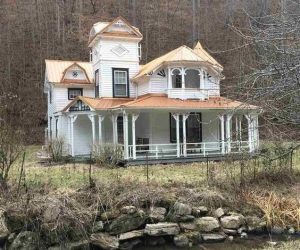Historical Victorian home in East Tennessee
An historical Victorian home in East Tennessee would be a charming and unique piece of architecture, reflecting the eclectic and ornate design style that flourished during the late 19th century. Here’s a bit of an exploration into what such a house might look like:
Style and Architecture
Victorian homes typically embody various architectural styles, often grouped under the “Victorian” umbrella due to their prevalence during Queen Victoria’s reign (1837-1901). In East Tennessee, you might see elements from:
Gothic Revival: Pointed arches, steeply pitched roofs, and intricate woodwork in the trim.
Second Empire: Mansard roofs, dormer windows, and often a formal, grand style that could have been popular in more affluent areas.
Queen Anne: Asymmetrical facades, wraparound porches, and an abundance of decorative details like gingerbread trim, spindle work, and textured shingles.
Stick-Eastlake: A simpler, more rustic style with exposed structural elements and minimal decoration compared to other Victorian styles.
In a historical Victorian home, you’d find things like:
Steep rooflines: A hallmark of many Victorian homes, often with multiple gables, turrets, or even a widow’s walk.
Large porches: These homes often had expansive front porches with decorative columns, railings, and sometimes intricate carvings.
Ornate details: You might see carved woodwork in places like mantels, staircases, or trim, featuring intricate patterns.
Stained glass windows: Victorian homes often included beautifully colored glass in transom windows, doors, and bay windows.
Masonry or wood siding: Some houses may have brick or stone foundations, but wood siding, often painted in multiple tones, would also be common.
Tall windows and doors: Grandiose, oversized windows and doors were typical to maximize natural light and emphasize the height and airiness of the rooms.
Setting and Landscaping
East Tennessee’s lush, green landscape and varied topography could add a lot of character to a Victorian home:
Rolling Hills & Mountain Views: If the house was built in the more mountainous regions (like near the Smoky Mountains), it may have been constructed to take advantage of scenic vistas, with wide verandas or large windows to capture the views.
Mature Trees and Gardens: These homes typically had large yards with formal gardens. You might find thick rows of boxwoods, flower beds, or ornamental trees like magnolias or oaks. In some cases, Victorian homes were designed with a carriage house or barn, suggesting a level of affluence and space.
Porches and Outdoor Living: Given the climate of East Tennessee, where summers are warm and humid, a large front porch or even an outdoor gazebo would provide a cool, shaded spot for residents to enjoy the outdoors.

Interior Design
Inside, the homes would be sprawling, multi-storied, and filled with natural light.
High Ceilings and Elaborate Moldings: Victorian homes often had soaring ceilings (10-12 feet or more) with elaborate crown molding, wainscoting, and chair rails.
Parlor Rooms: A large front room, often the “parlor,” was a formal area for receiving guests. These rooms might have detailed plasterwork on the ceiling, chandeliers, and marble or stone fireplaces with ornate mantels.
Wood Paneling and Hardwood Floors: Dark wood paneling, often in mahogany or oak, would add a sense of opulence, with hardwood floors throughout, sometimes with inlaid patterns or borders in entryways or dining rooms.
Fireplaces: In addition to grand mantelpieces, the fireplaces themselves might be made from marble, slate, or cast iron, and they were often focal points in various rooms, such as the living room, dining room, or even bedrooms.
Stained Glass and Leaded Windows: The addition of stained glass, either in transoms or as part of the window structure, would contribute to the whimsical, artistic character of the home.
Historical Significance in East Tennessee
Rich History: East Tennessee’s history dates back to the early 19th century, and many Victorian homes in the region might have been built during or after the Civil War, particularly in the cities like Knoxville or Chattanooga, or in the more affluent suburbs.
Cultural Influence: You might find that these homes also reflect the cultural influences of East Tennessee, including elements of Southern architecture like wide verandas and porch swings, blending Southern tradition with Victorian flair.
Restoration & Modern Day
Owning a historical Victorian home in East Tennessee today would require careful restoration and maintenance to preserve the historical features, while updating the home to modern comforts. Many of these homes have been updated with modern plumbing, electrical systems, and HVAC systems, but restoring original features like woodwork, windows, or doors can be a labor of love. Some homes may be listed on the National Register of Historic Places, providing owners with tax incentives or grants for preservation.
In Summary:
A historical Victorian home in East Tennessee offers a unique combination of opulent and intricate architecture with the charm of Southern living. From wraparound porches to ornate interior details, these homes provide a sense of history, craftsmanship, and timeless beauty. If you’re drawn to history, architecture, or even just the serenity of East Tennessee, owning one of these homes would be like owning a piece of living history.
